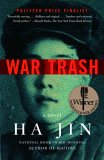Summary | Excerpt | Reading Guide | Reviews | Readalikes | Genres & Themes | Author Bio

Critics' Opinion:
Readers' Opinion:
First Published:
Oct 2004, 368 pages
Paperback:
May 2005, 368 pages
1. Crossing The Yalu
Before the Communists came to power in 1949, I was a sophomore at the Huangpu Military Academy, majoring in political education. The school, at that time based in Chengdu, the capital of Szechuan Province, had played a vital part in the Nationalist regime. Chiang Kai-shek had once been its principal, and many of his generals had graduated from it. In some ways, the role of the Huangpu in the Nationalist army was like that of West Point in the American military.
The cadets at the Huangpu had been disgusted with the corruption of the Nationalists, so they readily surrendered to the People's Liberation Army when the Communists arrived. The new government disbanded our academy and turned it into a part of the Southwestern University of Military and Political Sciences. We were encouraged to continue our studies and prepare ourselves to serve the new China. The Communists promised to treat us fairly, without any discrimination. Unlike most of my fellow students who specialized in military science, however, I dared not raise my hopes very high, because the political courses I had taken in the old academy were of no use to the People's Liberation Army. I was more likely to be viewed as a backward case, if not a reactionary. At the university, established mainly for reindoctrinating the former Nationalist officers and cadets, we were taught the basic ideas of Marx, Lenin, Stalin, and Mao Zedong, and we had to write out our personal histories, confess our wrongdoings, and engage in self- and mutual criticism. A few stubborn officers from the old army wouldn't relinquish their former outlook and were punished in the reeducation program-they were imprisoned in a small house at the northeastern corner of our campus. But since I had never resisted the Communists, I felt relatively safe. I didn't learn much in the new school except for some principles of the proletarian revolution.
At graduation the next fall, I was assigned to the 180th Division of the People's Liberation Army, a unit noted for its battle achievements in the war against the Japanese invaders and in the civil war. I was happy because I started as a junior officer at its headquarters garrisoned in Chengdu City, where my mother was living. My father had passed away three years before, and my assignment would enable me to take care of my mother. Besides, I had just become engaged to a girl, a student of fine arts at Szechuan Teachers College, majoring in choreography. Her name was Tao Julan, and she lived in the same city. We planned to get married the next year, preferably in the fall after she graduated. In every direction I turned, life seemed to smile upon me. It was as if all the shadows were lifting. The Communists had brought order to our country and hope to the common people. I had never been so cheerful.
Three times a week I had to attend political study sessions. We read and discussed documents issued by the Central Committee and writings by Stalin and Chairman Mao, such as The History of the Communist Party of the Soviet Union, On the People's Democratic Dictatorship, and On the Protracted War. Because about half of our division was composed of men from the Nationalist army, including hundreds of officers, the study sessions felt like a formality and didn't bother me much. The commissar of the Eighteenth Army Group, Hu Yaobang, who thirty years later became the Secretary of the Chinese Communist Party, even declared at a meeting that our division would never leave Szechuan and that from now on we must devote ourselves to rebuilding our country. I felt grateful to the Communists, who seemed finally to have brought peace to our war-battered land.
Then the situation changed. Three weeks before the Spring Festival of 1951, we received orders to move to Hebei, a barren province adjacent to Manchuria, where we would prepare to enter Korea. This came as a surprise, because we were a poorly equipped division and the Korean War had been so far away that we hadn't expected to participate. I wanted to have a photograph taken with my fiance before I departed, but I couldn't find the time, so we just exchanged snapshots. She promised to care for my mother while I was gone. My mother wept, telling me to obey orders and fight bravely, and saying, "I won't close my eyes without seeing you back, my son." I promised her that I would return, although in the back of my mind lingered the fear that I might fall on a battlefield.
Excerpted from War Trash by Ha Jin, chapter 1 and part of chapter 2 (pages 6-20) of the hardcover edition. Copyright© 2004 by Ha Jin. Excerpted by permission of Pantheon, a division of Random House, Inc. All rights reserved. No part of this excerpt may be reproduced or reprinted without permission in writing from the publisher.





The Funeral Cryer by Wenyan Lu
Debut novelist Wenyan Lu brings us this witty yet profound story about one woman's midlife reawakening in contemporary rural China.
Your guide toexceptional books
BookBrowse seeks out and recommends the best in contemporary fiction and nonfiction—books that not only engage and entertain but also deepen our understanding of ourselves and the world around us.